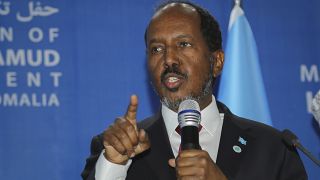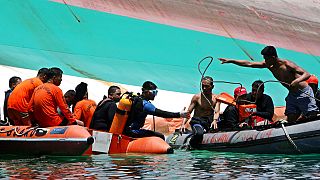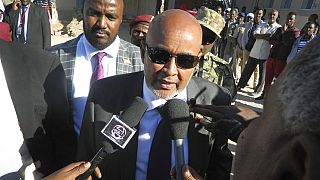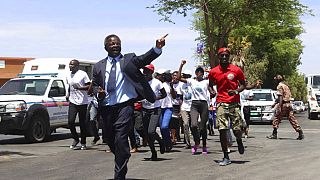Somalia
United Nations officials visited Baidoa and Kismayu cities in Somalia on Monday to assess the impact of drought on people in the South West and Jubaland States, which are some of the hardest hit regions in the country.
UN humanitarian co-ordination for Somalia, Peter de Clercq, and John Ging, Director of the Operational Division of the United Nations Office for the Co-ordination of Humanitarian Affairs, along with other humanitarian organizations’ representatives met with Somali officials and discussed the pressing needs of affected regions.
“We talked about how we can work together towards fighting the drought and to prevent a famine from happening, so as to enable the people get the type of assistance they deserve. We need the cooperation of South West authorities in terms of making sure that this camp is safe; that we can build toilets and latrines here in this camp. So we need that cooperation to work together towards fighting drought and the famine and the acute water diarrhoea and cholera situation,” said de Clerq.
According to the UN, there are about 150,000 newly displaced people in Baidoa alone due to the drought.
The drought has also decimated harvests and livestock in the war-torn country, posing the threat of renewed famine six years after a similar crisis in which 260,000 people died in 2011.
Around 6.2 million Somalis, around half the population, need aid after the drought withered crops, killed livestock and dried up waterholes in East Africa.
Authorities say the cities of Baidoa and Kismayu have been the hardest hit, where more than 700,000 drought victims come from.
The delegation also visited two camps for internally displaced people in Beerta Muuri in Baidoa and Dalxiska in Kismaayu, as well as medical centres in both cities.
“This is my mother. She got sick at Goof Gaduud Shabellow. She was suffering from diarrhoea and vomiting. Her health situation is better than yesterday. We got good doctors, better medical check-up, chlorine and oral rehydration salts,” said Habiba Ahmed, a Baidoa resident.
“I got sick with diarrhoea while looking after a sick child in the hospital. I was admitted in this ward. My health situation is better now. I was admitted suffering from diarrhoea and vomiting but now I am recovering, “ added Barwaqo Mohamed Ali, a patient at Kismayo General Hospital.
Somalia also continues to be rocked by security problems, with the capital Mogadishu and other regions controlled by the federal government coming under regular attack from al Qaeda-linked group, al Shabaab.












01:27
Activists highlight plight of world's hungry ahead of G20 summit in Brazil
01:40
UN report warns of famine, aggravated by conflicts and climate shocks
01:38
New York meeting seeks unified approach to Sudan's ongoing crisis
01:06
Zimbabwe announces plans to cull dozens of elephants, due to food shortages from drought
01:12
Flooding in west and central Africa worsens after dam collapse in Nigeria
01:58
Essential supplies blockade threatens lives in North Darfur